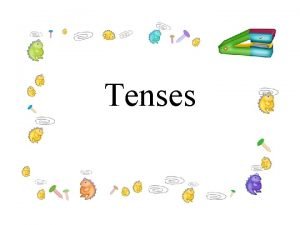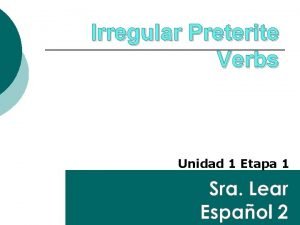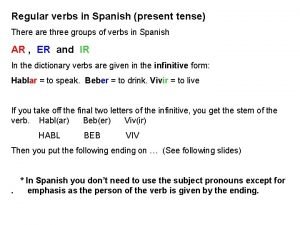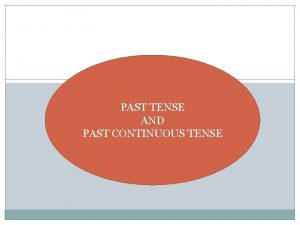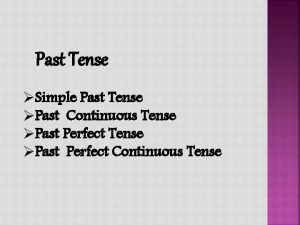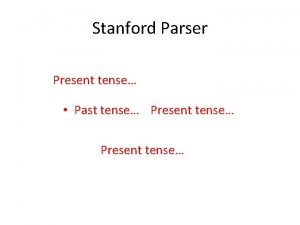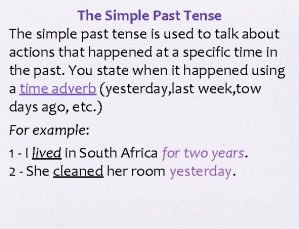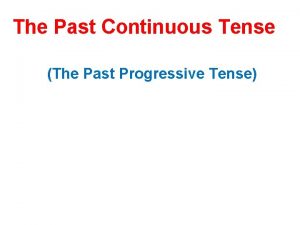THE SPANISH PAST TENSE SPANISH HAS TWO PAST

















- Slides: 17

THE SPANISH PAST TENSE

SPANISH HAS TWO PAST TENSES: PRETERITE AND IMPERFECT.

THE PRETERITE The preterite is used to talk about what happened in the past. It is mostly used for completed actions. There are two sets of endings for regular verbs: one for -ar verbs one for -er and -ir verbs

THE IMPERFECT The imperfect is also used to talk about what happened in the past. Generally, it refers to descriptions or action seen without a specific beginning or end. There are two sets of endings for regular verbs: one for -ar verbs and one for -er and -ir verbs

WHAT? Preterite = completed actions Imperfect = descriptions/on going/vague I danced at the party. Preterite Yesterday I ate an apple. Preterite I used to play tennis. Imperfect I was not feeling well. Imperfect I did my homework yesterday. Preterite She was a very nice teacher. Imperfect The next day, we drove to school. Preterite I always studied for the tests. Imperfect

Preterite = completed actions Imperfect = descriptions/on going/vague WHAT? Which words would help you indicate the PRETERITE In the morning yesterday Once Which words would help you indicate the IMPERFECT Tuesday frequently Last summer Many times sometimes A lot generally

To conjugate regular -ar verbs in the preterite, simply drop the -ar and add one of the following: Preterite Endings é amos aste ó aron

camiar caminé caminamos caminaste caminó caminaron

To conjugate regular -er and -ir verbs in the preterite, simply drop the -er and -ir and add one of the following: í imos iste ió ieron

comer Comí Comimos Comiste Comió comieron

salir salí salimos saliste salió salieron

To conjugate regular -ar verbs in the imperfect, simply drop the ending -ar and add one of the following- abas ábamos aban

bailar bailaba bailábamos bailaban

To conjugate regular -er and -ir verbs in the imperfect, simply drop the -er and -ir and add one of the following: ía ías ía íamos ían

correr corrías corríamos corrían

salir salíamos salían

Traduce? • • Preterite = completed actions Imperfect = descriptions/on going/vague Preterite Yo bailé con mi novio a la fiesta. Ayer yo comí una manzana. Preterite Imperfect Yo jugaba el tenís. Imperfect Yo estaba enfermo. Yo trabajé en la granja ayer. Preterite El próximo día, conducíamos a la escuela. Siempre estudiaba. Imperfect
 Present past future simple
Present past future simple Need future tense
Need future tense Image past
Image past Simple past tense vs past continuous tense
Simple past tense vs past continuous tense Past continuous tense cut
Past continuous tense cut Have present continous
Have present continous Perfect simple tense คือ
Perfect simple tense คือ Tense
Tense Past tense simple continuous
Past tense simple continuous Past continuous past perfect
Past continuous past perfect Past perfect simple vs past perfect continuous
Past perfect simple vs past perfect continuous Querer past participle
Querer past participle Ser and ir preterite
Ser and ir preterite Hacer preterite
Hacer preterite Preterite of regular ar verbs
Preterite of regular ar verbs Past tense conjugation
Past tense conjugation Past and future tense verbs
Past and future tense verbs Past perfect tense
Past perfect tense







